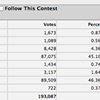Switch to the mobile version of this page.
Vermont's Independent Voice
- News
- Arts+Culture
- Home+Design
- Food
- Cannabis
- Music
- On Screen
- Events
- Jobs
- Obituaries
- Classifieds
- Personals
Browse News
Departments
Browse Arts + Culture
View All
local resources
Browse Food + Drink
View All
Browse Cannabis
View All
-
Culture

'Cannasations' Podcaster Kris Brown Aims to 'Humanize'…
-
True 802

A Burlington Cannabis Shop Plans to Host…
-
Business

Judge Tosses Burlington Cannabiz Owner's Lawsuit
-
Health + Fitness

Vermont's Cannabis Nurse Hotline Answers Health Questions…
-
Business

Waterbury Couple Buy Rare Vermont Cannabis License
Browse Music
View All
Browse On Screen
Browse Events
View All
Quick Links
Browse Classifieds
Browse Personals
-

If you're looking for "I Spys," dating or LTRs, this is your scene.
View Profiles
Special Reports
Pubs+More
Thursday, November 6, 2014
Election 2014 Calling Shumlin Victory 'Premature,' Milne Considers Contesting Result
Posted By Paul Heintz on Thu, Nov 6, 2014 at 1:24 PM
Updated at 7:50 p.m. with more from Scott Milne and Lt. Gov. Phil Scott.
Democratic Gov. Peter Shumlin says he won Tuesday’s razor-thin gubernatorial race, but Republican Scott Milne is considering contesting the outcome.
The Pomfret businessman called Shumlin’s declaration of victory “premature” in a statement issued Thursday afternoon and said he might consider requesting a recount. Milne also suggested he might call on the Vermont legislature to name him governor, instead of Shumlin, when it convenes in January.
“It’s clear that 54 percent of Vermonters want a new governor and a new path forward,” Milne said in the statement, referring to those who voted for one of Shumlin’s six opponents.
According to the latest Associated Press count, which includes all polling places, Shumlin led Milne by 2,095 votes. The incumbent picked up 89,883 votes, or 46.4 percent, compared with the challenger’s 87,788 votes, or 45.3 percent.
Vermont’s constitution calls on the legislature to select the governor, lieutenant governor or treasurer from among the top three vote-getters when none take more than 50 percent of the vote.
That’s happened in 23 previous gubernatorial races — most recently when Shumlin narrowly defeated Republican Brian Dubie for the open seat in 2010. In all but three instances, the legislature chose the candidate who won a plurality. The last time it didn’t was in 1853, according to the AP.
But in his statement Thursday, Milne cited a different historical precedent. In 1976, the legislature selected Republican T. Garry Buckley over Democrat John Alden in the race for lieutenant governor, even though Alden came out slightly ahead on Election Day. Rumors were circulating at the time that Alden was under investigation for fraud, and he was later convicted.
“If we move forward, I expect Peter Shumlin has a good likelihood of facing the same fate as John Alden,” Milne said, “and I will be Vermont’s next governor.”
In an interview Thursday evening, Milne said he would decide by Monday whether to request a recount, though he said he had no reason to believe preliminary counts were inaccurate.
“I haven’t really thought through that. If it stays at 2,000 votes, it’s probably statistically solid,” he said of the difference between the top two candidates. “My sense is that 2,000 is probably where it’s going to be.”
Milne said his campaign was trying to determine whether more legislative districts had voted for him than for Shumlin. If so, he said he might ask legislators representing such districts to support him when they meet in a joint session to select the governor by secret ballot.
“I think we want to understand what the numbers are and then figure out what our path forward is gonna be,” he said, adding that he would make such a decision next Wednesday after the results are certified.
Asked why the legislature should overrule a plurality of voters, Milne said, “Because we have a constitution that dictates the way we do these things.”
Though he argued that 54 percent of Vermonters hadn’t voted for Shumlin, Milne conceded that 55 percent hadn’t voted for him.
“Except I’m not the incumbent governor, but you’re right,” he said. “That’s true.”
Asked why the governor’s incumbency was relevant to the question, Milne said, “I believe the election was a referendum on Peter Shumlin and he lost.”
Milne’s current take on how the legislature should go about naming the next governor appears to be at odds with the position he took a week and a half before the election in an interview with the AP’s Dave Gram:
“[Democrats] had control of both houses. He obviously had more to lose than I did. And he didn’t take me up on it,” Milne said of the purported challenge. “I imagine now he would like to take me up on it, but he didn’t when the time was right.”
Milne claimed he hadn’t reversed his position.
“I don’t believe I’ve changed my mind. I believe there was a vote in which 54 percent of the people said they wanted a different person than Peter Shumlin. It was, I believe, the closest election in Vermont history,” he said. “And Peter Shumlin did not take up the opportunity before the election to say he would concede if I won a plurality and not a majority. And that’s something I’ll take into consideration when we figure out what we’re going to do next week.”
Asked again whether that represented a change of position, Milne said, “If you’d like to move on to another question, I’d be glad to continue. Otherwise, I have a meeting I have to get into in a second.”
Milne said he did not think Vermonters would consider him a sore loser because, “A, I haven’t decided what I’m doing yet. And, B, if I do go forward with this, it’s because, one, I think I have a chance of winning in the legislature and, two, because I think it’s a good and healthy exercise for Vermont.”
He added, “If we move forward, it would be a couple more months of Peter Shumlin having to defend his record and be a little more specific about what he’s going to do in the next biennium than if I were to just concede.”
In a press conference Wednesday afternoon in Burlington, Shumlin said he had not heard from Milne since the polls closed and would not weigh in on what his opponent should do.
“Obviously Scott Milne has to make his own decisions about what he thinks the next move is,” he said.
But Shumlin left little doubt about who he thinks should be governor come January.
“I’m personally humbled by last night’s results and I’m also proud that we won,” he said. “I’m disappointed that I didn’t receive a wider margin, but I’m grateful that we received the most votes cast.”
Asked Thursday to weigh in on Milne's threat to bring the fight to the legislature, Shumlin campaign manager Scott Coriell echoed the words of his boss.
"Scott Milne has to decide what's right for him to do, given that the results show the governor won the most votes in this election," Coriell said.
House Speaker Shap Smith (D-Morrisville) said Thursday he doesn't think his fellow legislators will hand the governorship to Milne.
"My expectation is that people will observe historical precedent, which is that the winner of the plurality ends up winning the race," Smith said. "He clearly is trying to ignore historical precedent, and that's his prerogative. I don't know whether people will jump to his side on that one."
Though Democrats lost 11 seats in the House on Tuesday, they will still control 85 of 150 next year; Progressives will hold seven. In the Senate, Democrats lost two seats, but they and Progressives will control a collective 21 seats out of 30.
Lt. Gov. Phil Scott, a Republican, said that if he were in Milne’s position, he would not request a recount, “because I think it would cost a lot of money and would cause a lot of work for a lot of people.”
But Scott said there was no reason for Milne to bow out now.
“I’m not sure what he’d have to lose,” Scott said. “The legislature has to formally go through that no matter what his decision is. So whether he concedes or not is immaterial. Formally, we have to do this. So I don’t know what he loses by waiting. Two thousand votes isn’t a lot, and I think it’s appropriate that he, at the very least, wait for the secretary of state to release a more formal outcome than what we’ve seen so far.”
Nevertheless, the former state senator said that if he were still in the legislature, he would vote for Shumlin.
“If it was me, I would vote for the person who had the most votes overall,” Scott said. “I believe that the person with the most votes, a plurality — that should dictate the outcome, from my standpoint.”
Democratic Gov. Peter Shumlin says he won Tuesday’s razor-thin gubernatorial race, but Republican Scott Milne is considering contesting the outcome.
The Pomfret businessman called Shumlin’s declaration of victory “premature” in a statement issued Thursday afternoon and said he might consider requesting a recount. Milne also suggested he might call on the Vermont legislature to name him governor, instead of Shumlin, when it convenes in January.
“It’s clear that 54 percent of Vermonters want a new governor and a new path forward,” Milne said in the statement, referring to those who voted for one of Shumlin’s six opponents.
According to the latest Associated Press count, which includes all polling places, Shumlin led Milne by 2,095 votes. The incumbent picked up 89,883 votes, or 46.4 percent, compared with the challenger’s 87,788 votes, or 45.3 percent.
Vermont’s constitution calls on the legislature to select the governor, lieutenant governor or treasurer from among the top three vote-getters when none take more than 50 percent of the vote.
That’s happened in 23 previous gubernatorial races — most recently when Shumlin narrowly defeated Republican Brian Dubie for the open seat in 2010. In all but three instances, the legislature chose the candidate who won a plurality. The last time it didn’t was in 1853, according to the AP.
But in his statement Thursday, Milne cited a different historical precedent. In 1976, the legislature selected Republican T. Garry Buckley over Democrat John Alden in the race for lieutenant governor, even though Alden came out slightly ahead on Election Day. Rumors were circulating at the time that Alden was under investigation for fraud, and he was later convicted.
“If we move forward, I expect Peter Shumlin has a good likelihood of facing the same fate as John Alden,” Milne said, “and I will be Vermont’s next governor.”
In an interview Thursday evening, Milne said he would decide by Monday whether to request a recount, though he said he had no reason to believe preliminary counts were inaccurate.
“I haven’t really thought through that. If it stays at 2,000 votes, it’s probably statistically solid,” he said of the difference between the top two candidates. “My sense is that 2,000 is probably where it’s going to be.”
Milne said his campaign was trying to determine whether more legislative districts had voted for him than for Shumlin. If so, he said he might ask legislators representing such districts to support him when they meet in a joint session to select the governor by secret ballot.
“I think we want to understand what the numbers are and then figure out what our path forward is gonna be,” he said, adding that he would make such a decision next Wednesday after the results are certified.
Asked why the legislature should overrule a plurality of voters, Milne said, “Because we have a constitution that dictates the way we do these things.”
Though he argued that 54 percent of Vermonters hadn’t voted for Shumlin, Milne conceded that 55 percent hadn’t voted for him.
“Except I’m not the incumbent governor, but you’re right,” he said. “That’s true.”
Asked why the governor’s incumbency was relevant to the question, Milne said, “I believe the election was a referendum on Peter Shumlin and he lost.”
Milne’s current take on how the legislature should go about naming the next governor appears to be at odds with the position he took a week and a half before the election in an interview with the AP’s Dave Gram:
Milne said he would concede the race if Shumlin won a plurality, and hoped Shumlin would do the same if the situation were reversed.But on Thursday, Milne framed his response to Gram as a “challenge” to Shumlin to agree to accept the will of a plurality.
As for the Democratic majorities in the Legislature, Milne said, "If I'm ahead I expect the Legislature will honor the wishes of the people of Vermont."
“[Democrats] had control of both houses. He obviously had more to lose than I did. And he didn’t take me up on it,” Milne said of the purported challenge. “I imagine now he would like to take me up on it, but he didn’t when the time was right.”
Milne claimed he hadn’t reversed his position.
“I don’t believe I’ve changed my mind. I believe there was a vote in which 54 percent of the people said they wanted a different person than Peter Shumlin. It was, I believe, the closest election in Vermont history,” he said. “And Peter Shumlin did not take up the opportunity before the election to say he would concede if I won a plurality and not a majority. And that’s something I’ll take into consideration when we figure out what we’re going to do next week.”
Asked again whether that represented a change of position, Milne said, “If you’d like to move on to another question, I’d be glad to continue. Otherwise, I have a meeting I have to get into in a second.”
Milne said he did not think Vermonters would consider him a sore loser because, “A, I haven’t decided what I’m doing yet. And, B, if I do go forward with this, it’s because, one, I think I have a chance of winning in the legislature and, two, because I think it’s a good and healthy exercise for Vermont.”
He added, “If we move forward, it would be a couple more months of Peter Shumlin having to defend his record and be a little more specific about what he’s going to do in the next biennium than if I were to just concede.”
In a press conference Wednesday afternoon in Burlington, Shumlin said he had not heard from Milne since the polls closed and would not weigh in on what his opponent should do.
“Obviously Scott Milne has to make his own decisions about what he thinks the next move is,” he said.
But Shumlin left little doubt about who he thinks should be governor come January.
“I’m personally humbled by last night’s results and I’m also proud that we won,” he said. “I’m disappointed that I didn’t receive a wider margin, but I’m grateful that we received the most votes cast.”
Asked Thursday to weigh in on Milne's threat to bring the fight to the legislature, Shumlin campaign manager Scott Coriell echoed the words of his boss.
"Scott Milne has to decide what's right for him to do, given that the results show the governor won the most votes in this election," Coriell said.
House Speaker Shap Smith (D-Morrisville) said Thursday he doesn't think his fellow legislators will hand the governorship to Milne.
"My expectation is that people will observe historical precedent, which is that the winner of the plurality ends up winning the race," Smith said. "He clearly is trying to ignore historical precedent, and that's his prerogative. I don't know whether people will jump to his side on that one."
Though Democrats lost 11 seats in the House on Tuesday, they will still control 85 of 150 next year; Progressives will hold seven. In the Senate, Democrats lost two seats, but they and Progressives will control a collective 21 seats out of 30.
Lt. Gov. Phil Scott, a Republican, said that if he were in Milne’s position, he would not request a recount, “because I think it would cost a lot of money and would cause a lot of work for a lot of people.”
But Scott said there was no reason for Milne to bow out now.
“I’m not sure what he’d have to lose,” Scott said. “The legislature has to formally go through that no matter what his decision is. So whether he concedes or not is immaterial. Formally, we have to do this. So I don’t know what he loses by waiting. Two thousand votes isn’t a lot, and I think it’s appropriate that he, at the very least, wait for the secretary of state to release a more formal outcome than what we’ve seen so far.”
Nevertheless, the former state senator said that if he were still in the legislature, he would vote for Shumlin.
“If it was me, I would vote for the person who had the most votes overall,” Scott said. “I believe that the person with the most votes, a plurality — that should dictate the outcome, from my standpoint.”
Tags: Scott Milne, Vermont election, Vermont government, Image, Web Only
Comments (8)
Showing 1-8 of 8
Comments are closed.
Since 2014, Seven Days has allowed readers to comment on all stories posted on our website. While we’ve appreciated the suggestions and insights, the time has come to shut them down — at least temporarily.
While we champion free speech, facts are a matter of life and death during the coronavirus pandemic, and right now Seven Days is prioritizing the production of responsible journalism over moderating online debates between readers.
To criticize, correct or praise our reporting, please send us a letter to the editor. Or send us a tip. We’ll check it out and report the results.
Online comments may return when we have better tech tools for managing them. Thanks for reading.
Related Stories
About The Author

Paul Heintz
Bio:
Paul Heintz was part of the Seven Days news team from 2012 to 2020. He served as political editor and wrote the "Fair Game" political column before becoming a staff writer.
Paul Heintz was part of the Seven Days news team from 2012 to 2020. He served as political editor and wrote the "Fair Game" political column before becoming a staff writer.











































